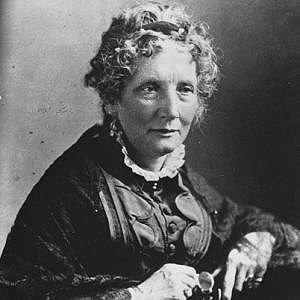|
Calling Things As They Are |
||
|
Harriet Elisabeth Beecher (June 14, 1811 - July 1, 1896) was born in Litchfield, Connecticut, the sixth of 11 children of a Presbyterian minister and a mother whose grandfather was General Andrew Ward, who served under General George Washington in the Revolutionary War. Unusual for women at the time, she received a traditional academic education from the Hartford Female Seminary, focusing on classical antiquity studies, languages, and mathematics. In 1832, Beecher moved to Cincinnati, Ohio, to join her father, who had become the president of Lane Theological Seminary. It was here that she met Calvin Ellis Stowe, who was a professor of Biblical Literature at the seminary. The two married on January 6, 1836. Living near the Ohio River across from Kentucky, a state where slavery was legal, Beecher, now Stowe, was exposed to the nature of slavery and its negative ramifications on Black Americans and the rest of society. Stowe's faith in Jesus Christ, her increasing understanding of the evils of slavery from the testimony of escaped slaves, and the compelling arguments of abolitionist apologists strongly influenced her to become a passionate abolitionist and supporter of the Underground Railroad, which helped many fugitives from slavery escape to freedom in Canada. She was the author of more than 30 books covering a wide range of interests, including textbooks for children, books providing advice for homemaking, raising children, biographies, and religious studies. Though capable of writing scholarly works, Stowe chose to write in an informal way to reach common, everyday people and encourage them to address controversial moral issues of the day. Her mathematical training helped her see things in a logical fashion and describe them as they are in truth. Stowe believed God's purpose for her life was to write and that her words and the actions coming from them could make a positive difference in the world and be an extension of God's grace.
Her best-known work was Uncle Tom's Cabin (1852), a novel depicting the horrible realities of slavery through the central character Uncle Tom, a Black slave who endured great suffering ending in a terrible death but refused to abandon his faith in Christ, do violence to other slaves, or betray those who escaped. Uncle Tom showed that Christian love, forgiveness, and redemption could overcome slavery. Uncle Tom's Cabin portrayed the ugly truth of slavery instead of softening or hiding it behind euphemisms such as "southern paternalism" or "peculiar institution." It became a bestseller and helped to change attitudes, especially in the northern states, toward Black Americans and slavery. While some historians believe that this book helped pave the way for the Civil War, it certainly strengthened the abolitionist cause, which assisted in ending chattel slavery in America. Not mincing words when addressing moral issues of the day helped to end a great sin in the society in which Stowe lived. This kind of forthrightness is being used by some in efforts to end another great evil in society today. Terrisa Bukovinac is the founder and former executive director of Progressive Anti-Abortion Uprising (PAAU), an organization involved with peacefully protesting abortion facilities, compassionately reaching out to the women going to them, educating the public about the exploitative influence of the abortion industry, and connecting abortion-vulnerable women with life-saving resources. In a 2022 interview with Fox News Digital, Bukovinac said, "Abortion is murder, and we need to act like it." Recalling a protest at an abortion facility in Alexandria, Virginia, she stated that the focus of her work was to see abortion come to an end nationwide. Though she and some of her colleagues were arrested, their efforts led to five women not going through with an abortion, thus saving the lives of five babies. Knowing that federal political campaign advertisements could not be censored, Bukovinac decided to run for president as a Democrat in 2024 to expose the reality of abortion, show its victims, and give them a voice. Her commercials showed graphic images of aborted babies with the purpose of moving the American people to end this evil practice. Though a self-professed atheist holding to a Marxist political philosophy, Bukovinac at least recognized the humanity of children in the womb and wanted to do everything she could to be an advocate for those unable to speak for themselves, going beyond what many pro-life conservative organizations and politicians have done. She rejected euphemisms such as "pro-choice," "health care," or "reproductive rights" to show the horrible reality of abortion, the gruesome ending of a human life at its weakest and most vulnerable stage. "Pikuach Nefesh" is Hebrew for "save a life." It is also the name of one of the ministries of Congregation Shema Yisrael, a Messianic Jewish congregation in southeast Michigan. Its purpose is to deter abortion and proclaim the goodness of life and the evil of abortion. Because of their faith in Jesus Christ and the truth that human beings are made in the image of God and therefore precious, participants in this ministry show up on the sidewalk at a local abortion facility every month to share the gospel message and pray for the mothers, fathers, babies, and workers in the facility. Like Stowe and Bukovinac, Pikuach Nefesh does not proclaim its message with euphemisms but with unvarnished truth. They display messages exhorting mothers to let their precious babies live and saying that there are free life-saving resources available to them. They also show graphic images of the aftermath of babies killed through abortion to show the horrific reality and give mothers going inside the facility pause to consider what they are about to do to their child. On one occasion, their efforts led to six women choosing life for their babies. Reforming societal wrongs requires calling things as they are rather than sugarcoating the painful truth. This is especially true when it comes to recognizing the reality of one's position before God, whom even self-professed atheists know exists (Romans 1:18-32). While working to set captives free, saving the lives of children in the womb, and doing other good works are commendable, they are not good enough because all of us have sinned and fallen short of God's perfect righteous standards (Romans 3:19-26; James 2:10). But God has provided salvation from the eternal consequences of our sins through His Son Jesus Christ, who lived the perfect life we could not, died the death we deserved, was buried, and rose again from the dead on the third day. Repent and put your full faith in Jesus Christ alone, for He is your only hope of being in good standing before God, whom we all will meet someday (Hebrews 9:27-28). |
||
| What Is the Gospel? | What Must I Do to Be Saved? | Home | Contact Us | Return | ||

